Ways to Inspire Creativity at Work
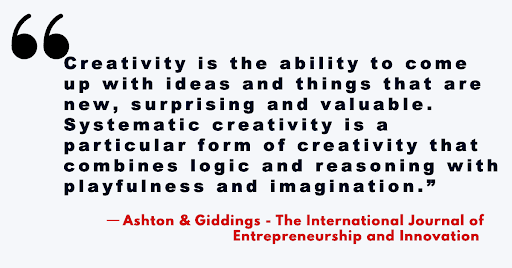
How do organizations succeed in creating innovative climates and cultures? Some of the best-known success stories include those of Google and Lego. Turns out, they share qualities and characteristics that have been clearly identified. We’ll try to help you understand them—maybe even well enough to create a culture of innovation at the organization you serve. Here goes…
What’s Required for Creativity & Innovation to Take Root
Innovation is like evolution, it changes things. And those who innovate bring change to our work, our cultures, our lives, and our futures. Let’s go out on a limb here for a minute and decide change is something we want. How do we create a culture that fosters innovation and encourages innovators? Can we deliberately set about to do that? Can we succeed in discovering new ideas and unexplored pathways, or will change disrupt the status quo? The answer to all of these questions is: yes! And therein lies the potential for some honest talk, a bit of risk-taking, the need for trust and support, probably some conflict, maybe even some breakage, and all the good that can come from it.
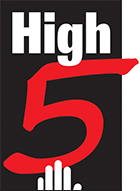
Recently, High 5 Edge of Leadership teammates Sam Copland, Ryan McCormick, and Chris Sanchez led a workshop on the characteristics, climate, conditions, and general care and feeding of innovative organizations. Their presentation at High 5’s Annual Symposium, Bad Ideas Can Only Get Better, addressed innovation by asking people to go out on a limb and create a game. Equipped with spartan supplies, a pen and 2 note cards, participants were asked to write a noun on one card and an adjective on another. Then they set off to mingle with others until they found a combination of words that would transform into a fun game such as Quaint Rocking Chair (a work in progress at right). The creation of the game provided an opportunity to experience innovative thinking compressed into a 90-minute session.
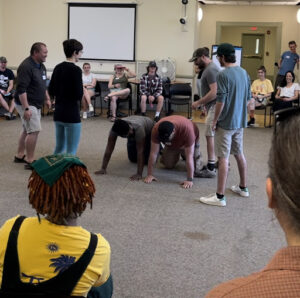
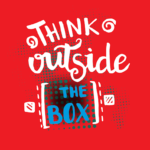
Framing to Guide Your Way
To shape an innovative culture and create a supportive climate, we have to make it possible for change makers to think and act outside ‘the box’ of the usual and comfortably predictable. Some bulldozing of existing company normative behavior may be necessary if a top-down management structure permeates your organization. If the desire to change your culture is genuine, then an acceptable level of risk-taking will be necessary, but only after a round of open conversations has allowed everyone to express their concerns. Here’s a framework to guide those conversations…
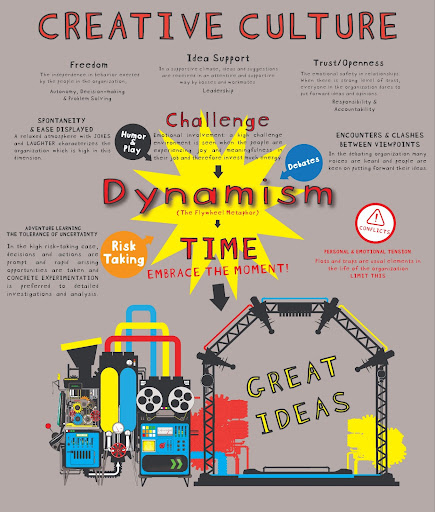
- Challenge. Challenge in this respect relates to the emotional involvement of the members of the organization in meeting its operational goals. A high-challenge climate is seen when people experience joy and meaningfulness in their work, and invest a high level of effort and energy in their success. Low challenge leads to feelings of alienation and indifference; the common sentiment and attitude is apathy and lack of interest in their work and in the organization generally.
- Freedom. One hallmark of innovative organizations is the level of independent behavior demonstrated by the employees. In a climate of this sort, people make connections, give and receive information, discuss problems and alternative solutions, and make decisions. In a more constrained environment, people are passive, more sensitive to following rules and anxious to stay inside known boundaries for acceptable behavior.
- Idea Support. In a supportive climate, leaders and colleagues are attentive to and supportive of new ideas. People listen to and encourage one another and new ideas are received and considered positively and with an eye toward trying them out. When idea support is low, every suggestion is immediately refuted by a counter-argument, and fault- finding and obstacle-raising are the usual reception.
- Trustworthiness. There needs to be emotional safety in an innovative culture. When there is a high level of trust, individuals risk voicing ideas and opinions. New initiatives can be considered without fear of failure, and communications are straightforward and direct. When trust is missing, people are suspicious and fearful of one another and the possibility of having a good idea stolen, or wary of the risk and retaliation for mistakes.
- Dynamism and Liveliness. In dynamic organizations, new things happen all the time, often necessitating a change in the way issues are thought about and handled. The process of evaluating and adapting to new ideas charges the day-to-day atmosphere, bringing a high level of energy to daily life. A lack of liveliness is the norm in more traditional, highly controlled organizations. No new ideas and no new projects—in fact nothing new or different at all—creates an enervating climate where same-old-same-old defines life and the hands of the clock move way too slowly.
- Playfulness and Humor. Laughter and light-hearted joking are characteristics of an innovative environment. Where jokes and laughter are seen as inappropriate or inconsistent with ‘doing business’ the working day is heavy, gloomy and fraught with the fear of disapproval. Yuck.
- Debates. Point and counterpoint are common denominators of an innovative organization. Everyone has a base of experience from which they view life and the initiatives of a dynamic work culture. And in that culture opinions are expressed and discussion is welcome. People are eager to present their ideas and willing to defend them, keeping an open mind when it comes to making decisions. Where debate is stifled, the climate is authoritarian and controlling and presenting an innovative idea just isn’t worth the risk of conflict, ridicule, or censure.
- Conflicts. In an innovative organization, social intelligence and psychological insight help everyone to avoid the personal and professional conflicts that create emotional tensions. People are tolerant of one another and respectful of strengths and weaknesses. When coworkers are disrespectful and denigrate one another’s ideas, personal emotions and tensions run high, creating an environment that is disruptive and destructive of the group’s ability to work together cooperatively and collaboratively on discovering the best solutions to problems.
- Risk Taking. There are days in an innovating culture when you have to leap almost without looking. Tempering the tolerance for risk with trust helps individuals and organizations face uncertainty with confidence. Decisions must often be made quickly and, while careful experimentation is preferable, it may not be possible to examine all of the what ifs. On the contrary, in a risk-avoiding culture, decisions are made cautiously, even hesitantly, often marked by a ‘let’s sleep on it’ approach. Having a committee to examine committees that, in turn, are examining committees that are, in turn, making decisions may help to avoid pitfalls, but so much finely-granulated deliberation is likely to smother innovation and creativity.
- Idea Time. The amount of time people can and do use for exploring and elaborating on new ideas is a critical element in the innovative organization. In a spontaneous application of idea time, opportunities are created to discuss and test suggestions that were not planned or included in the task assignment. When the latitude for spontaneous meeting and shaking the idea tree is missing, every minute is scheduled and dedicated to a specific task. Over-scheduling makes the time needed for thinking outside the ‘box’ of detailed instructions and rigid routines impossible.
Brainstorm Next Steps Forward
It’s hard to make a transition in organizational culture from Whoa to Wow! without the benefit of some honest and thoughtful analysis and some experimentation. As Ashton and Giddings wisely observed, “Creativity requires constant experimentation, which implicitly involves the fear of failure. Not all creative endeavors are successful; mistakes are part of the process, and a no-fear attitude is an essential component of innovation.” Similarly, Sam, Ryan and Chris urged participants in their workshop to playfully go ahead and take risks because occasionally, Bad Ideas Can Only Get Better. The workshop illustrated a creative culture at work, or should we say at play. Your next innovative endeavor, if you choose to accept it, is to embrace the moment and think of ways a creative culture can be developed in your workplace. Be sure to sign up to get 3 downloadable activities and try them out with your group.
Additional Resources
- Blog: How to be More Creative This Year
- Learn more about High 5’s Team Development Programs
Reference Articles
Ashton, D. and Giddings, S. (2018) ‘At work in the toybox: bedrooms, playgrounds and ideas of play in creative cultural work’, The International Journal of Entrepreneurship and Innovation.
Andriopoulos Constantine, Gotsi Mansi (2002) ‘Lessons from a Creative Culture’, Design Management Journal Vol. 13, No. 2 Invention, Innovation, and Cultural Change
Ekvall Goran (1996), ‘Organizational Climate for Creativity and Innovation’, European Journal of Work and Organizational Psychology Vol. 3 (1)
Jahanzeb Shah* and Bakhtiar Ali (2012) ‘Super-leadership: An approach to maximize idea generation and creative potential for creative culture’ African Journal of Business Management Vol. 6(1
HIGH 5 ADVENTURE LEARNING CENTER
130 Austine Drive, Suite 170
Brattleboro, VT 05301
Office: 802-254-8718
Toll Free: 877-356-4445
Fax: 802-251-7203
Privacy Policy
